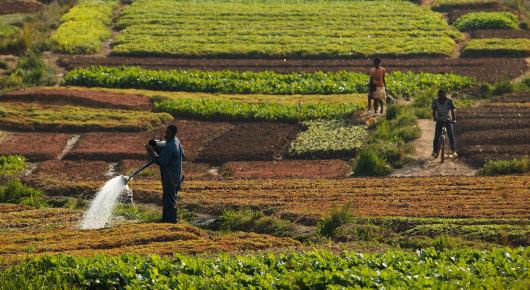FAO at COP23: agroecology helps achieve climate commitments

A sustainable and holistic approach to agriculture and the environment is being promoted by FAO at this week’s global climate change event in Bonn, Germany.
Together with the governments of Hungary and France, and with the International Food Policy Research Institute (IFPRI), FAO is presenting “agroecology” as a way to produce enough food for a growing population, while protecting natural resources and livelihood and responding to climate change. The event is part of the 23rd Conference of the Parties to the UN Framework Convention on Climate Change, taking place throughout this week in Bonn.
Today’s event continues a series of awareness-raising events organized by FAO in all regions of the world. The panel discussion focuses on how agroecology can support countries in their efforts to adapt agriculture to climate change, build resilience, improve food security and meet their Paris Agreement commitments.
The term “agroecology” means the application of ecological concepts and principles to optimize interactions between plants, animals, humans and the environment while taking into consideration the social aspects needed for sustainable and fair food systems. In short, it is an ecosystem-based, integrated and cross-sectoral approach that has the potential to change agricultural practices and policies towards a sustainable direction.
The approach emphasizes the value of local solutions, linkages with the local economy and markets, and aims to provide incentives for farming with improved livelihoods and better quality of life.
Agroecology can have global effects, too.
“Countries will take the lead in taking transformative climate action in the agricultural sectors, but FAO and the international community must support developing countries in doing so,” said Vladimir Rakhmanin, FAO Assistant Director-General and Regional Representative for Europe and Central Asia, speaking at Bonn today.
“This is not only an imperative, but also a tremendous opportunity for sustainable development,” he added.
Rakhmanin noted that in total, 15 countries explicitly mentioned agroecology in their Nationally Determined Contributions – a set of resolutions to which nations commit themselves in line with the Paris climate change agreement – and many others aim to address climate change issues from an agro-ecological perspective.
In his welcoming words Hungarian Minister of Agriculture Sandor Fazekas said that agroecology addresses the three dimensions of sustainability: economic, environmental, and social, making it well integrated in the globally accepted Sustainable Development Goals.
“The Hungarian Government treats the protection and sustainable use of natural resources as a priority,” Fazekas added.
“Agriculture, livestock and forestry can provide solutions to climate change,” said Stéphane Travert, Minister of Agriculture of France. “We must continue our efforts towards agroecology on the long term, and the support of FAO is essential. It is important to further exchange views on these solutions.”
The expert panel emphasized the importance of system thinking for achieving a sustainable future, the relationships between agroecology and organic farming, and illustrated with agroecological practices at farm and community level. In the high-level segment, Ministers of Poland, Tunisia, Burkina-Faso, and the host countries Hungary and France, spoke on the role and comparative advantages of agroecology.
Jan Szyszko, Minister of Environment of Poland and President of the next Conference underlined that “climate and nature protection are key for sustainable development”.
“Agroecology is a solid approach for us, particularly in the Sahelian countries which are more exposed to climate uncertainty, to ensure sustainable economies and production methods,” said Batio Bassiere, Minister of Environment, Green Economy and Climate Change of Burkina-Faso.
Samir Taïeb, Minister of Agriculture, Hydraulic Resources and Fisheries of Tunisia pointed at challenges his country has to face, such as "maintaining productive agricultural lands, producing more and better despite severe constraints, and finally developing expertise in agroecology to facilitate the transition while anticipating the effects of climate change.”
16 November 2017, Bonn, Germany
